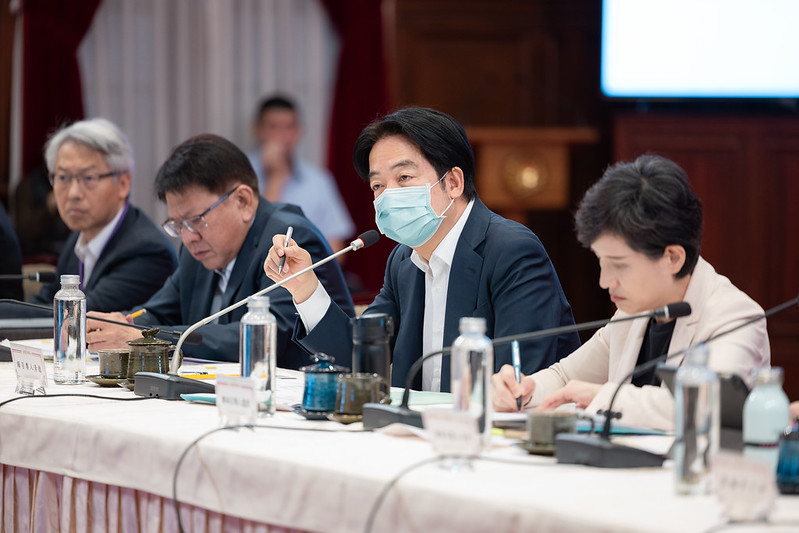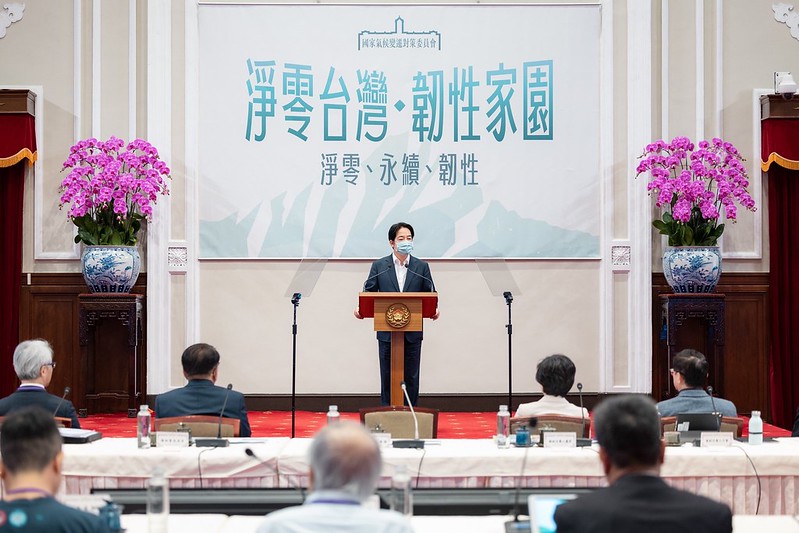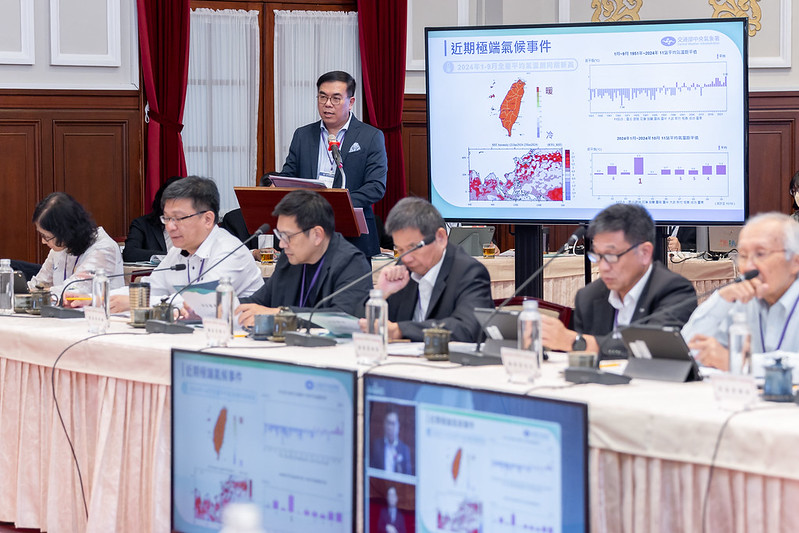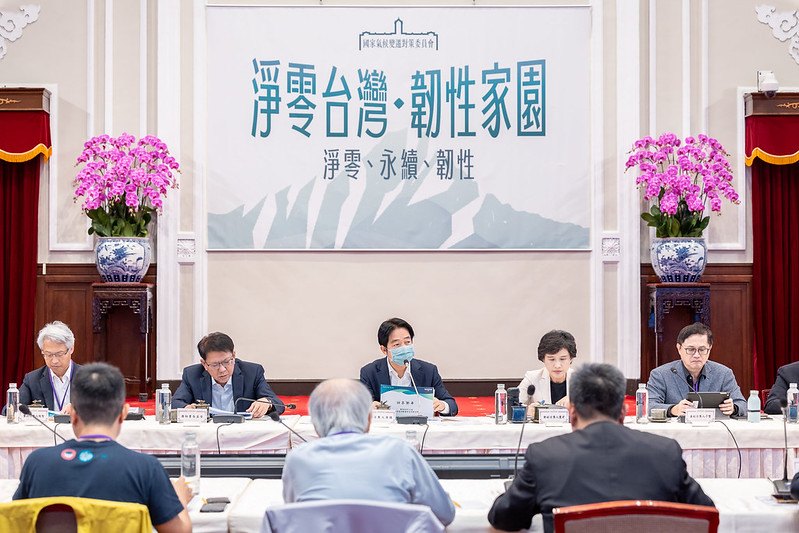News & activities
 News releases
News releases
On the afternoon of October 24, President Lai Ching-te presided over the second meeting of the National Climate Change Committee. In his opening statement, the president said that the whole world is now facing the challenges of extreme weather and carbon reduction. Noting that Taiwan plays a critical role in global technology supply chains, the president stated that we must step up climate action to enhance the international competitiveness of our industries and quicken our pace to bring us in line with global progress on carbon reduction. He added that we are willing to cooperate with countries around the world, including China, to address the challenges of climate change together.
President Lai emphasized that the government’s strategic direction is clear: we will promote our second energy transition to ensure a stable and resilient energy supply. Going forward, he said, the government will gradually promote energy conservation policies and encourage all sectors to promote deep energy saving through such methods as investment incentives, investment tax credits, and government subsidies to help industries save energy. He added that energy service company (ESCO) mechanisms will also be promoted through cooperation with insurance enterprises and life insurance companies to improve enterprise equipment and production processes. The president expressed his confidence that as long as everyone works together to implement innovative and transformative change, we can create opportunities for sustainable growth for generations to come.
A translation of President Lai’s opening statement follows:
Today is the second meeting of the National Climate Change Committee. First, I want to welcome the committee members who were on leave for the first meeting but are with us today: Paul Peng (彭双浪), Sophia Cheng (程淑芬), and Lin Tze-luen (林子倫).
I want to thank everyone here with us today, as well as our fellow citizens and friends for their enthusiastic participation online. This shows that everyone considers global climate change issues as matters of great importance.
Not long ago, we saw Typhoon Krathon become the first tropical cyclone on record to make landfall in Kaohsiung in the month of October, with recorded gusts at level 17 or higher on the Beaufort scale. Responding to climate change is a major test for national resilience and sustainable development.
Internationally, the whole world is facing increasingly severe climate change challenges. The Paris Agreement of 2015 requires each country to update its nationally determined contributions (NDCs) every five years. In 2021, COP26 increased the frequency of such updates to once every two years to accelerate progress in global carbon reduction. In addition, the next round of NDC updates for countries around the world is scheduled for the beginning of next year.
Therefore, we must come together and create a strong, resilient Taiwan that can respond to challenges and align with international trends. At the same time, we are willing to continue strengthening cooperation with countries around the world, including China, to address the challenges of climate change together.
At the beginning of this month, we launched a carbon fee system, with fees starting to be collected next year. This is a solid step. Furthermore, our strategic direction is clear: we will promote our second energy transition to ensure a stable and resilient energy supply. In addition to developing more forms of green energy to open up new energy sources, we must also promote deep energy saving and advanced energy storage technology applications to spur the transformation and development of next-generation industries; enhance Taiwan’s adaptive mechanisms to respond to climate change; and seek green growth opportunities for sustainability, as we steadily move toward our goal of net-zero emissions by 2050.
At today’s meeting, the Ministry of Environment will first deliver reports on the progress of certain items listed in the first committee meeting and on the promotion of the public sector chief sustainability officer alliance. The Ministry of Economic Affairs will then deliver a report on the progress in deep energy saving promotion.
I want to thank Deputy Convener and Vice Premier Cheng Li-chiun (鄭麗君) for conducting numerous inter-ministerial policy discussions in the Net Zero Emissions Transition Taskforce, under the Executive Yuan’s National Council for Sustainable Development, in the time since we convened our first meeting in August this year.
In a few minutes, Executive Secretary and Minister of Environment Peng Chi-ming (彭啓明) will explain our initial concept for an energy information platform and the current review status of our new carbon reduction goals, two issues of great concern to our committee members. The reports will help committee members and the public to better understand the government’s policies.
As Taiwan plays a critical role in global technology supply chains, we must step up climate action to enhance the international competitiveness of our industries and quicken our pace to bring us in line with NDCs internationally. We also need to review our goals for 2030, be more ambitious to break through obstacles, and reset new, more proactive carbon reduction goals for 2032 and 2035.
At the same time, the best source of energy is the energy we conserve. Our economic development requires that industries and foreign investors continue to invest in Taiwan, which requires a stable power supply. Conserving energy is more efficient than developing new energy sources and is one of the most important cost-effective methods. It is also an immediately effective strategy for reducing carbon emissions. The more energy we save, the more we can reduce carbon emissions.
One of the conclusions reached during last year’s United Nations Climate Change Conference (COP28) was that by 2030, the average annual improvement rate of energy efficiency must be increased from 2 percent to 4 percent. Increasing energy efficiency is already an international consensus and trend in efforts to achieve net-zero emissions.
Going forward, the government will gradually promote energy conservation policies and encourage all sectors to promote deep energy saving. From high-emission enterprises to hospitals and schools, and even homes and individuals, everyone needs to participate. The government cannot promote deep energy saving alone. Like a baseball team, for the team to be really good, everyone must play their role.
Energy service companies (ESCO), like analysts and trainers on baseball teams, can provide enterprises with the most cost-effective, tailor-made energy-saving plans to ensure that every dollar invested achieves the best possible energy savings.
Moving forward, in promoting deep energy saving, we need ESCOs to be involved to strengthen our “lineup.” The government will cooperate with industry to propose methods including investment incentives, investment tax credits, and government subsidies to help industries save energy. The government will also cooperate with insurance enterprises and life insurance companies to promote ESCO mechanisms, and will provide funding assistance to upgrade equipment and improve production processes, with the savings on electricity costs returned to investors. Insurance premiums will be used for national development, forming a virtuous circular economy.
The whole world is now facing the challenges of extreme weather and carbon reduction. But I am confident that as long as everyone works together to implement innovative and transformative change, we can create opportunities for sustainable growth for generations to come.
Through this meeting, we will not only rely on the expertise of our advisors and committee members for diverse discussions and collective brainstorming. We will also reference innovative and pragmatic strategies for green growth adopted by countries such as the United Kingdom and Japan. Through joint actions of the public sector in conjunction with the various sectors of society, we can more efficiently accelerate Taiwan’s efforts to achieve net-zero carbon emissions.
In a few minutes, I will invite everyone to actively share your expertise and experience. Thank you.
Following his statement, President Lai heard a report on the promotion of the public sector chief sustainability officer alliance from Minister Peng and a report on the progress in deep energy saving promotion from Vice Minister of Economic Affairs Lien Ching-chang (連錦漳). Afterward, President Lai exchanged views with the committee members regarding the content of the reports.






